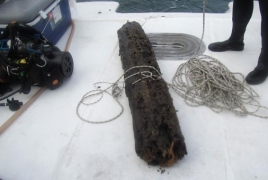60,000-year-old underwater forest could help pioneer new medicines April 8, 2020 - 16:12 AMT PanARMENIAN.Net - Nearly 60,000 years ago, a forest of cypress trees grew on the banks of a river near the Gulf of Mexico. As the trees grew old, they fell and were buried under sediment. When the sea level rose, the remains of the forest were covered once again. Now, scientists have uncovered that same forest and believe it may hold the secrets to creating new medicines and saving lives, CNN reports. The site, which now lies 60 feet underwater off Alabama's coast in Mobile Bay has been visited by a few filmmakers and scientists, including Brian Helmuth, a professor of marine and environmental sciences at Northeastern University and one of the scientists who dived in. Despite the wood being 60,000 years old, it was extremely well-preserved because it had been buried under layers of sediment that prevented oxygen from decomposing it. But the real excitement for the scientists started when they took the wood back to the lab. Out of the more than 300 animals that were removed from the wood, scientists were particularly focused on just one: shipworms, a type of clam that converts wood into animal tissue, according to NOAA. And the bacteria found from the shipworms that had been living inside the 60,000-year-old wood had never been discovered before. The shipworms from the ancient wood produced 100 strains of bacteria, many of them novel, and 12 are undergoing DNA sequencing to evaluate their potential to make new drug treatments. In addition to lifesaving medicines, scientists will study the new samples to see whether they can be applied in production of paper, textiles, food, animal feeds, fine chemicals and renewable fuels, according to NOAA. Authorities said a total of 192 Azerbaijani troops were killed and 511 were wounded during Azerbaijan’s offensive. In 2023, the Azerbaijani government will increase the country’s defense budget by more than 1.1 billion manats ($650 million). The bill, published on Monday, is designed to "eliminate the shortcomings of an unreasonably broad interpretation of the key concept of "compatriot". The earthquake caused a temporary blackout, damaged many buildings and closed a number of rural roads. Partner news |